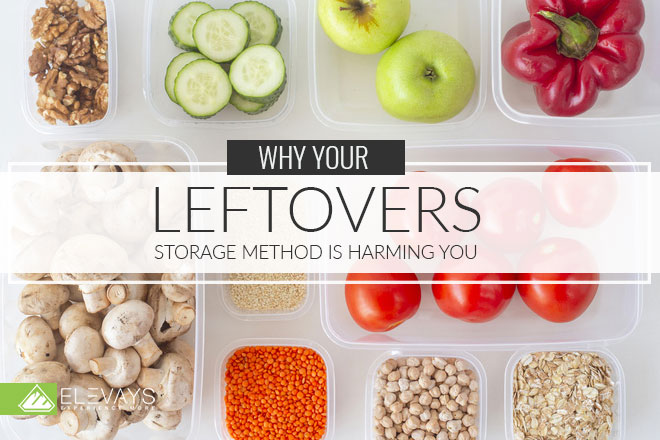What is the best part about slaving over a glorious dinner? Leftovers. There is nothing better than looking forward to a guaranteed amazing lunch the next day. My family is huge on leftovers! Leftovers are easy. Maybe you love them because the only effort it takes on your part is pressing reheat on the microwave.
But here is the main problem with leftovers: the product you store them in. Plastic containers like Tupperware or other name brands are home to tons of toxic chemicals that can leach into your food. Not to mention, when heated, your toxic exposure is only intensified by as much as 55%! In addition, when a container is old, scratched, frequently washed with harsh detergents- chemicals leach from the plastic into food faster!
The hazardous chemicals and additives found in food containers have been linked to reproductive and developmental problems and more! In this mini article, I am going to take you through the major chemicals offenders found in plastic food storage and then explain why glass food storage is the best alternative.
Toxins Found In Food Storage
BPA and BPS
You’re probably familiar with Bisphenol A (BPA) already. Most plastic reusable water bottles are being labeled with a “BPA free” sticker- but that doesn’t mean that they are automatically ok for you. Replacements like Bisphenol S (BPS) are just as bad, if not worse.
Plastics like BPA and BPS are known endocrine disruptors meaning that they mimic estrogen and throw your hormones out of balance. The toxic effects of BPA and BPS are well-documented. While a lot of brands are taking BPA out of their plastic products, many are not. Here is why you should ditch plastic food storage containing BPA
- BPA causes male reproductive dysfunction
- BPA studies show that the population most at risk is fetuses
- Studies have shown that BPA can produce several defects in the embryo
- Long term exposure to BPA can lead to endocrine disorders in women: morphological changes in ovary, uterus, vagina, and oviducts – all linked to fertility issues
- BPA has been linked to breast cancer tumors
BPS is not any better though. Recent reports found that more than 80% of Americans have detectable levels of BPS in their urine and blood. Studies also found that it can lead to diabetes, obesity, birth defects, asthma, and cancer. What is important to note here is that just because something is labeled BPA-free, doesn’t mean it is safe.
Phthalates
While you may have already been familiar with the toxic effects of BPA, you may not know as much about phthalates. To increase durability, flexibility, and transparency, companies add chemical compounds called phthalates to products. Phthalates are known endocrine disruptors that send your hormones all out of whack, just like BPA and BPS. When we have excess hormones, we have hormone imbalance, and we all know that an imbalance in the body can lead to a host of health issues. The population most susceptible to phthalate danger is young children, that is why it is so important that you switch to glass containers!
Glass Container Alternatives
Glass food containers are the healthiest alternatives to plastic storage. While you should consider avoiding microwaves as much as you possible, storing your food in glass will keep your food safe and healthy. Glass containers will be your leftovers best friends!
Replacing your plastic kitchenware is an easy and affordable step you can take to creating a non-toxic environment. Pyrex glass containers are personally what we use in our home and we love them. Not only are they the best option for our health but they are also easy to store! Organization is something that is so important in the kitchen. In addition, they are durable, easy to clean, and will last forever!
Sources:





READ the Latest
Health Habits
Longevity
Health Habits
Health Habits